display
In Germany, the regulations for a nationwide Corona “emergency brake” have come into force.
The provisions of the new infection protection law have been in effect since Saturday at midnight.
The brake is being pulled in areas where the
seven-day incidence
exceeds
the limit of 100 new infections per 100,000 population
.
Is the scope on three successive days, the measures will enter into force on the second day, including
contact restrictions
and a
nightly curfew 22-5 indicator
count.
Exit restrictions apply on Saturday in those counties or urban districts in which the incidence was over 100 last Tuesday, Wednesday and Thursday.
In public or in private rooms, members of a household are only allowed to
meet one other person
.
Meetings of spouses or life partners are also permitted - or if custody is exercised.
display
Shops for daily needs
such as supermarkets or drugstores will remain
open
regardless of the incidence
-
all others
will be
closed when the
incidence is 100
or more
in the affected district
.
However, if the incidence is between 100 and 150, it is possible to shop by
booking an appointment
.
Regardless of the incidence, ordered
goods
can be
picked up in the store
.
In
schools
, if the incidence is 100
or more, alternating lessons are
compulsory.
From a value of 165, only
distance lessons are
allowed.
Nocturnal curfew also affects people passing through
The night curfew is particularly controversial.
As a rule, night trips through affected districts are also prohibited.
Exit restriction means "not to go out, so does not mean to travel," said Federal Health Minister Jens Spahn (CDU) on Friday.
Exceptions for "valid reasons" are regulated by law.
In addition, according to the Federal Ministry of the Interior, transit through an affected district is possible if the incidence at the point of departure and destination of the trip is below the 100 limit.
display
Excluded from the exit restriction are, for example, medical emergencies, the practice of a profession, the care of people in need, the care of animals and the exercise of custody or access rights.
In these cases, of course, the car or the train can also be used, and truck drivers can also transport their goods, said Vice-Government Spokeswoman Martina Fietz.
She referred to the goal of the measures: "We continue to see a high number of new infections and we have to reduce them." The most effective means against new infections is contact reduction.
Fietz added: "With curfews, it is a drastic, but very sensible measure."
The spokesman for the Federal Ministry of the Interior, Steve Alter, explained the rules for transit if the journey leads from one unaffected area to another unaffected area, but on the way there is a district with an incidence of over 100.
The journey from A to B is "not canceled by the fact that the connection leads through a high incidence area, which means that a transit is possible according to this law".
On request, Alter later confirmed that this applied to all means of transport.
display
A previously known report by the Scientific Service of the Bundestag, on the other hand, came to the conclusion that any transit through an affected area was only possible in accordance with the exceptional purposes regulated in Section 28b of the Infection Protection Act.
Accordingly, in rural districts or urban districts in which the exit restriction applies, "staying in means of transport is prohibited" between 10 p.m. and 5 a.m.
The "Bild" newspaper first reported on the report.
According to the newspaper, the regulation also poses problems for airports.
Passengers could not arrive for night and early flights during the curfew hours.
Also, in the case of high incidences in the region in question, no night flights could take off.
With the new regulation, for the first time in the corona pandemic, the federal government has assumed responsibilities that previously lay with the federal states.
The federal states may not loosen the federal "emergency brake", but tighten the rules further.
Numerous procedures for Corona “emergency brake” registered in Karlsruhe
One day after the new Infection Protection Act was signed, numerous constitutional complaints and urgent motions against it were registered at the Federal Constitutional Court in Karlsruhe.
Around 25 complaints had been received, said a court spokesman on Friday upon request.
The number is constantly changing, however, because new complaints are constantly being received.
For the Virchow Association of resident doctors, the current corona situation and the "emergency brake" offer an opportunity for optimism.
“I see the chance that the third wave will just be broken,” said chairman Dirk Heinrich of the “Neue Osnabrücker Zeitung” (Saturday).
The growing vaccination effect and the previous lockdown measures have already stabilized the numbers, now the emergency brake is on.
"Preventing risky meetings in the evening"
The curfews would "effectively prevent the risky evening meetings, because otherwise you won't come home," said Heinrich.
"There are currently too many infections in the private sector."
He is convinced: "We will win the race between vaccination rates and incidences if we keep our feet still for another two or three weeks, endure the lockdown and get faster with the vaccination," said Heinrich.
“At the end of May the situation will be much more relaxed.
Then we will have about twelve million people additionally vaccinated, then 30, 35 percent of the people will be vaccinated, and that helps enormously. "
According to the Robert Koch Institute, the nationwide seven-day incidence was 164 on Friday.

